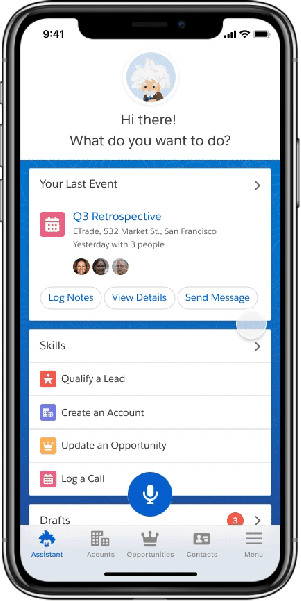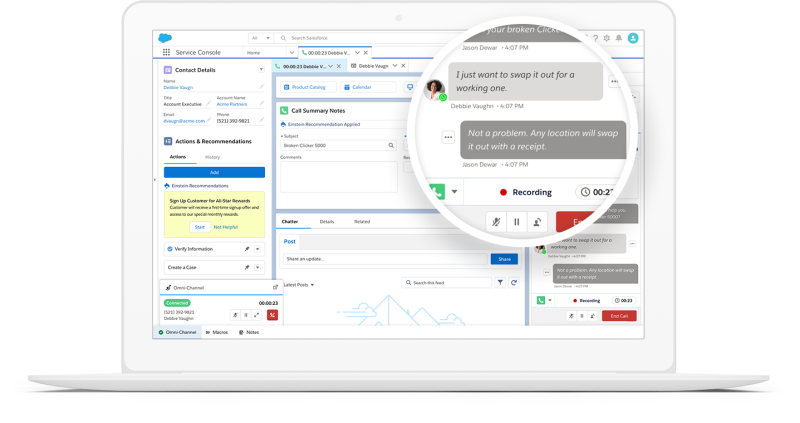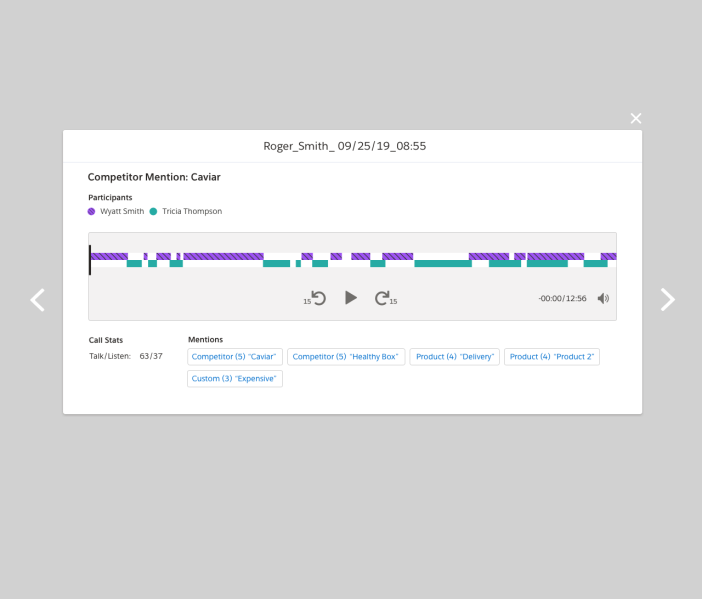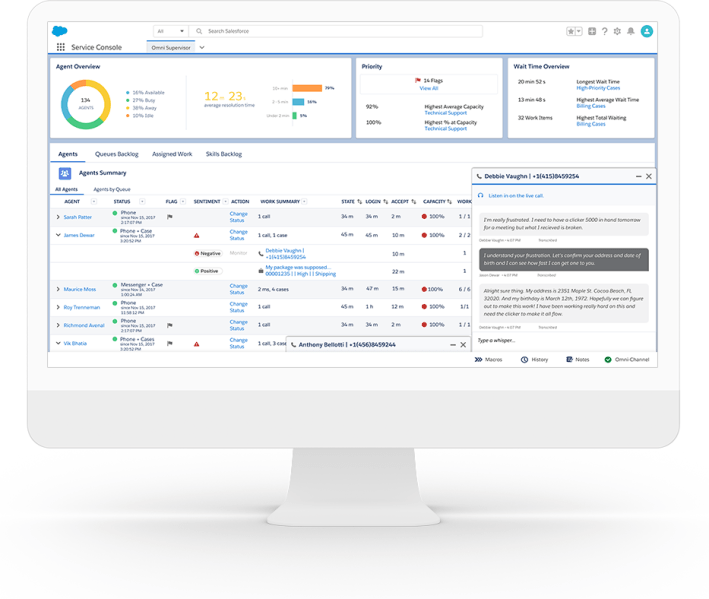Watch all the Transform 2020 sessions on-demand here.
Salesforce’s annual Dreamforce conference in San Francisco is in full swing, as evidenced by the steady clip of product- and service-related announcements. The tech giant this morning debuted Service Cloud Voice, a product it’s pitching as a “modernization” of the contact center that embeds telephony inside Service Cloud. Additionally, alongside a voice app development toolkit dubbed Einstein Voice Skills, Salesforce unveiled a revamped Einstein Voice Assistant, the virtual assistant integrated with every app built on Salesforce Customer 360.
Einstein Voice Assistant and Voice Skills
Einstein Voice Assistant is a component of Salesforce’s Einstein Voice, an outgrowth of the company’s Einstein technology that enables customers to navigate cloud services hands-free. One of its key advantages over other platforms is its versatility, so says Salesforce: It’s siloed, restricting data pulls to individual users’ accounts, and it can be “taught” to recognize jargon, acronyms, and slang in an organization’s lexicon.
Einstein Voice Assistant is more than just a glorified transcriber. Users can update Salesforce records and create tasks using natural language requests, or tap Einstein Vice Assistant to navigate through Einstein Analytics dashboards and surface metrics like open service cases and performance guidance. Plus, thanks to native integration with popular voice assistants like Google Assistant and Alexa, Einstein Voice Assistant can deliver a daily brief of “key priorities” like upcoming calendar appointments and teams pipeline updates.

June 5th: The AI Audit in NYC
Join us next week in NYC to engage with top executive leaders, delving into strategies for auditing AI models to ensure fairness, optimal performance, and ethical compliance across diverse organizations. Secure your attendance for this exclusive invite-only event.
For those in need of greater customization, there’s Einstein Voice Skills (previously Einstein Voice Builder), a toolkit that supports the creation of voice-powered corporate apps. From a setup page, developers and admins select customer relationship management actions — such as updating a field, creating a task, or reading out a prediction — and the fields or objects that inform each of those actions. Apps can be purpose-built for the needs of employee roles or teams, and Einstein Voice Skills affords control over how information (e.g., next steps and follow-up tasks) is read back and the channels and devices on which apps are accessible.
Both Einstein Voice Assistant and Einstein Voice Skills are available on a range of devices, including the newly revamped Salesforce Mobile app for Android and iOS, third-party smart speakers, and smart displays. That’s in addition to the Einstein Smart Speaker, an enterprise-focused concept device Salesforce demoed this week.
“We believe AI-enhanced conversational interfaces can transform business processes, which is why we are focusing heavily on innovation in this sphere and building in voice across the entire Salesforce system,” said Einstein voice senior director of product Michael Machado. “Voice allows companies to command and draw insight from Salesforce in a natural way, making an already powerful system even more powerful.”
Einstein Voice Assistant and Einstein Voice Skills complement Einstein Voice Bots, a chatbot design and orchestration service announced late last year. Bots built on the Einstein Bot Platform are compatible with Alexa, Google Assistant, and other voice assistants, and they can be tailored to reflect a given company’s brand.
Einstein-powered Voice Bots are primarily meant to be consumer-facing. An airline could build one that lets customers update their booking information in Salesforce, for example, or one that taps knowledge articles in Salesforce’s Service Cloud to answer commonly asked questions.
Cloud Voice
In a nutshell, Service Cloud Voice collates phone, digital channel, and customer support data in a unified remote console. It routes and automatically transcribes calls, surfacing transcriptions in real time in Service Cloud and attaching them to customer records for future reference. On the supervisory side, a bespoke dashboard lets managers view calls and conversations while monitoring where calls are being routed, as well as the skills of each agent and which conversations might require live (or post hoc) coaching.

Einstein ties in tightly with Service Cloud Voice on the backend. Specifically, it provides recommended solutions and next best actions for agents, like responses to common questions and relevant articles from a knowledge base. And it powers Einstein Call Coaching, which enables managers to glean insight from conversational data. Natural language processing identifies keywords in sales call transcripts, highlighting trends like a spike in competitor mentions or best practices on topics like objection handling and pricing discussions.

Above: Einstein Call Coaching
“Delivering great customer service consistently can be challenging for companies, especially when call volume is extremely high and the queries are becoming increasingly complex,” said Service Cloud executive vice president and general manager Bill Patterson. “These latest Service Cloud innovations will help companies meet these rising demands, and empower phone agents to focus on the human side of service — solving difficult problems for customers, and doing it with empathy.”
Salesforce says that Service Cloud Voice customers will be able to select the telephony provider of their choosing or keep their existing provider. As for those looking for an out-of-the-box solution, the company will partner with Amazon Connect, Amazon’s public cloud customer contact center service, to resell and deliver pre-integrated telephony inside of Service Cloud.
 The launch of Service Cloud Voice comes a week after Google made generally available Contact Center AI, its cloud service that taps AI to automate customer call center interactions. It offers a comparable assist feature that provides agents with knowledge resources during calls, in addition to virtual agents that respond to queries with voice or text or handoff conversations to people. In this way, it’s akin to CallJoy, Google subsidiary Area 120’s automated cloud-based telephone customer service agent, which recently added new customization features.
The launch of Service Cloud Voice comes a week after Google made generally available Contact Center AI, its cloud service that taps AI to automate customer call center interactions. It offers a comparable assist feature that provides agents with knowledge resources during calls, in addition to virtual agents that respond to queries with voice or text or handoff conversations to people. In this way, it’s akin to CallJoy, Google subsidiary Area 120’s automated cloud-based telephone customer service agent, which recently added new customization features.
There’s money to be made in the contact center automation space, without a doubt. Vonage — which incidentally acquired conversational AI startup Over.ai’s team and intellectual property in August — estimates that businesses collectively spend $1.3 trillion annually servicing 265 billion customer calls. The list of well-funded startups vying for supremacy is unsurprisingly lengthy, and includes Replicant, which raised $7 million in July to further develop its bot platform that answers customer questions over the phone; conversational AI company Uniphore, which nabbed $51 million in August; Boston-based call center analytics company Cogito, which raised $37 million in July 2018; Directly, which raised $20 million in April 2018; Dialpad, which also got $50 million in 2018; Quiq, which just raised $12.5 million this July; and countless others.
New identity and data services
Voice services and call center capabilities weren’t the only things Salesforce announced today. It also took the wraps off of new data and identity products, which will arrive in the coming weeks in Customer 360.
Data Manager delivers the ability to connect, resolve, and access data across a range of systems. It’s able to prepare, match, reconcile, and update profiles on command, with an exchange feature that pulls up customer info when needed. As for Identity for Customers, it provides a secure way to login to all of a company’s websites, apps, and connected products, with two-factor authentication and engagement reporting and analytics tools.
Next up is Audience Manager, which unifies customer profiles across known and unknown data like cookies, first-party IDs, and more. It creates customer segments and engagement journeys from those profiles and delivers AI-powered insights, like lifetime value and likelihood to churn.
Lastly, there’s Privacy and Data Governance, which allows companies to collect and respect customer data use and privacy preferences, as well as apply data classification labels to all data in Salesforce. It addresses obligations from regulations such as Europe’s General Data Protection Regulation (GDPR) and the California Consumer Privacy Act (CCPA), specifically those concerning data governance and customer consent.


